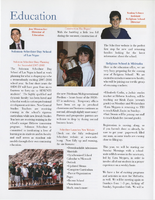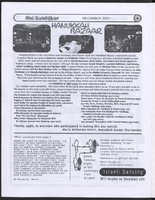Search the Special Collections and Archives Portal
Search Results
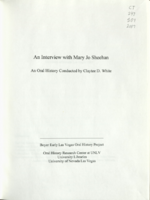
Transcript of interview with Mary Jo Sheehan by Claytee D. White, July 14, 2009
Date
Archival Collection
Description
Mary Jo Sheehan shares detailed memories of her family's early history, her father's search for work in mines in Oklahoma, Colorado, New Mexico, and Arizona, and her education through high school. She recalls with clarity the family's move to Henderson in 1945, her first job at Nellis Air Force Base, and their home in Victory Village. Mary Jo recalls bowling at the Emerald Casino, joining a sorority, and dining at the Frontier Hotel as part of her social life. She also remembers where she and her husband met in 1963. They were married at a friend's house first and later recommitted in a ceremony at St. Peter's Catholic Church. In recounting her career, Mary Jo talks of working at Nellis Air Force Base, then RFC War Assets Administration, the Colorado River Commission, and Basic Management Incorporated. Most recently she has done volunteer work for St. Rose Hospital and the Clark County Museum. Mary Jo shares many memories from her long history in Henderson, Nevada. These include events such as the PEPCON explosion in 1988 and the renovation of downtown Henderson beginning in the 90s; people like Hal Smith, Pat McCarran, and Selma Bartlett; and places such as the Swanky Club, the Emerald Casino, and the Black Mountain Golf Course. The fascinating end result is an overview of all the growth and changes in Henderson since the late forties.
Text
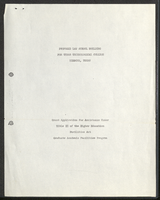
Law schools and law libraries: grant application, bibliography, article, and memos
Date
Archival Collection
Description
Folder contains a grant application for a proposed law school building for Texas Technological College, 1966; a bibliography of resources related to law schools; a scholarly article titled "Libraries, Liberties, and the First Amendment" by Robert M. O'Neil, 1973; and memos related to the development of a law library at UNLV. From the University of Nevada, Las Vegas William S. Boyd School of Law Records (UA-00048).
Text
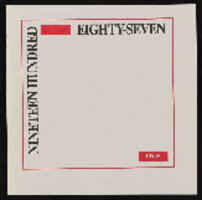
University of Nevada, Las Vegas (UNLV) 24th commencement program
Date
Archival Collection
Description
Commencement program from University of Nevada, Las Vegas Commencement Programs and Graduation Lists (UA-00115).
Text
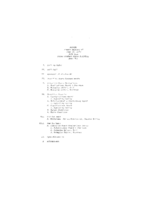
Meeting minutes for Consolidated Student Senate, University of Nevada, Las Vegas, June 19, 1979
Date
Archival Collection
Description
Text
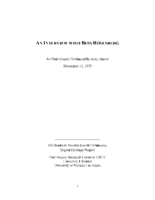
Transcript of interview with Bess Rosenberg by Jerry Masini, November 12, 1975
Date
Archival Collection
Description
Interview with Bess Rosenberg by Jerry Masini on November 12, 1975. In this interview, Rosenberg describes coming to Las Vegas in 1942, and the desert landscape. She gives an in-depth recollection of the first atomic test, and talks about different weather and the seasons in Las Vegas. Rosenberg describes several clubs and hotels around downtown and the recreation at Lake Mead and Mount Charleston.
Text

Transcript of interview with Liliam Lujan Hickey by Layne Karafantis, March 18, 2010, & March 25, 2010
Date
Archival Collection
Description
Liliam Lujan Hickey is best known in the state of Nevada for being the first Hispanic woman elected to the State Board of Education as well as for the enormous contributions she made while serving from 1998 to 2000. For this, an elementary school in Clark County bears her name. Despite many obstacles, Liliam has continually dedicated herself to standing up for the causes she believes in, such as providing preschool education to the underprivileged, preparing youth to enter the workforce, helping other Hispanics run for office, and proving that with enough courage anyone can accomplish their dreams. Born in Havana, Cuba in 1932, Liliam led a sheltered life that revolved mostly around her studies at a French Dominican school. She met her first husband, Enrique Lujan, when she was only sixteen and they wed soon after. Enrique was twelve years her senior, owned many casinos on the island, and provided a luxurious existence for Liliam and their three children. However, this lifestyle abruptly changed when Castro assumed power in 1959 and Liliam and her family were compelled to relocate to the United States. In Miami, Enrique assisted other refugees financially, hoping that his wealth would remain secure in Cuba. He was wrong. This left the family destitute. In addition to casinos, Enrique had been Cuba?s coach for the Olympics. He moved the family to York, Pennsylvania, where he hoped to find work at the York Barbell Company. Liliam, who had been accustomed to having maids and nannies in Cuba, found herself doing all the housework while she also worked in a factory. The change could not have been more dramatic and the living conditions became unbearable. The family chose to move to San Diego in a Volkswagen Minivan with the hope for a better life. The next few years brought many transitions. Things did turn around in San Diego, and Liliam she recalls her years in southern California as some of the happiest of her life. Liliam found a job working at the Scripps Clinic in La Jolla. After a few years, Enrique found a job in Las Vegas and the family moved again. In Las Vegas, Liliam gave birth to her fourth child, Mary, and life once again became financially difficult for the family. In 1972, the situation grew worse with Enrique?s untimely death. Liliam was a widow at forty years of age. She had to teach herself how to drive a car, write checks, and perform financial tasks that Enrique had insisted on managing while he was alive. Determined not to give up, however, she worked tirelessly to keep the family together. Amidst all this, a friend introduced Liliam to Tom Hickey, and after a brief courtship they were married in 1981. Within a few years, Liliam became active in politics, running for the State Board of Education. Her campaign manager advised her that voters would not be receptive to photos of a Hispanic woman on billboards, and to capitalize on the name “Hickey,” which was a recognizable name because her husband was an assemblyman. She took the manager?s advice and was elected in that campaign and for two more terms, the maximum limit for the office. After the first race, she proudly displayed her face on billboards across the state. During her time at the State Board of Education, Liliam dedicated herself to helping all children receive a better education in Nevada, not only Hispanics. She co-founded the Classroom on Wheels [COW] program, which brought buses to poor neighborhoods to provide pre-school education. She established Career Day, which pairs high schools students with business professionals in an effort to help them make the transition into the workforce. While the COW program is no longer running, 8 Career Day still operates and awards scholarships in Liliam?s name annually, which helps youth receive the educational opportunities they need to succeed. And she involved Hispanic youth in Boy Scouts by bringing ScoutReach to the Las Vegas valley. Lujan Hickey worked in a wide array of other community organizations. In the 1970s, she began to work with Circulo Cubano, which later became the Latin Chamber of Commerce, and she would later belong to the National Chamber of Commerce. A longstanding member of the League of Women Voters, Liliam saw the need to get Hispanics more involved in politics in the state. Her story is one of great inspiration, and when asked why she does it, she simply replies with a smile, “I love life.” Hickey?s narrative offers the reader a glimpse of the experiences of the Cuban refugee experience in the U.S. in general. Specific to Las Vegas, it provides a rare story of the experiences of early Latinas in the political and economic development of Las Vegas in the last half of the twentieth century.
Text
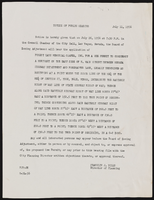
City of Las Vegas building codes, notices, correspondence
Date
Archival Collection
Description
City of Las Vegas building codes, notices, correspondence
Text

Andrea Gardea oral history interview: transcript
Date
Archival Collection
Description
Oral history interview with Andrea Gardea conducted by Barbara Tabach on June 26, 2019 for the Remembering 1 October Oral History Project. Gardea starts talking about her early life, family, and family history. She explains why she moved to Las Vegas, Nevada in 2002 and why she chose to attend University of Nevada, Las Vegas. After, Gardea describes what happened before and during the Route 91 Harvest festival, what she experienced during the shooting, and her journey in escaping the scene. She talks about the aftermath of the shooting, the trauma and PTSD experienced, and her healing process. Gardea also talks about the making of Engelland’s Vegas Born Heroes Foundation in 2018, what they do, and what they represent. Lastly, she talks about her opinions on gun control and her viewpoint on making peace.
Text

